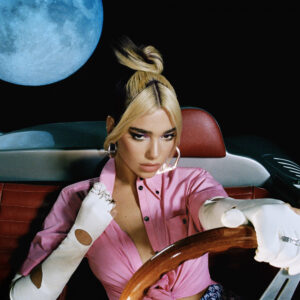Few modern albums take the risk of combining decades-old stylistic choices with new arrangements and succeed in the process.

Dua Lipa is a British singer famous for her 2017 debut self-titled album along with her collaboration with Calvin Harris on the song “One Kiss.”
“Future Nostalgia” was released Mar. 27 with collaborative producers such as Pharrell Williams and Max Martin working on the project.
Unlike her previous album being modern electro-pop and R&B centered, “Future Nostalgia” combines nostalgic and original sound to further pop music in the process.
The artist says she took inspiration from the 70s to 00s when making the album, and this is apparent throughout each song.
The opening titular track “Future Nostalgia” starts off with an electronic voice repeating the song title.
Lyrics of the first verse then begin describing the album’s overall tone and theme.
Lines such as “You want a timeless song, I wanna change the game; Like modern architecture, John Lautner coming your way” shows the pursuit of a timeless album that still creates a new, unique sound.
These lyrics are backed by 80’s-style electro-pop instrumentals and piano transitions.
After the second chorus, the song’s bridge develops a more funk-based feel.
The second track, “Don’t Start Now” uses an electro-disco form to push its theme of being released from a toxic relationship.
“Don’t show up, don’t come out, don’t start caring about me now” emphasizes this idea.
Every instrument drops out in the chorus’s hook, bringing emphasis to Dua Lipa’s voice and nearly making the world stop in the process.
The following track “Cool” uses heavy synth-pop elements, creating a decent dance-pop song, but one lacking in originality compared to others in the album.
“Physical” uses detailed lyrics to emphasize the intimate focus of the track.
The entire song seems to never slow down, with lines “adrenaline keeping on rushing in” relating to the listener from start to finish.
“Levitating” has a very 90’s-radio feel coupled with a disco beat and rhythm guitars to make it an instant hit.
The group vocals also make it extremely catchy, electronic echoes doing an extreme service to the song’s repeatability.
Very reminiscent of artists like The Spice Girls and Gwen Stefani, the song is still molded into its own unique style.
The next track “Pretty Please” takes a slower pace then the previous tracks.
The unrestricted lyrics along with the smooth beat continues to keep the album at a steady pace.
The pace picks up speed though with the track “Hallucinate” having a heavy dance-pop vibe.
The song is extremely entrancing, though similarities to other pop songs of modern day take some aspects of originality away from the piece.
Dua Lipa describes the following track “Love Again” as “very dramatic” in an interview with Spotify.
The melancholic strings and the desperation heard in her lyric delivery make this an incredibly passionate song.
Lyrics such as “I never thought that I would find a way out, I never thought I’d hear my heart beat so loud” show the despair of leaving a relationship.
Similar to “Don’t Start Now,” another impassioned song, “Break My Heart” uses a European beat and retro-futuristic theme throughout.
In an interview with Apple Music, Dua Lipa describes the track’s subject as “a celebration of vulnerability and being open about the vulnerable side of being in love, where I previously saw as weakness.”
She further explains that it’s about both being happy in love, but also in fear that the love could go away.
“I’m a hopeless romantic and always ask myself: ‘How am I going to protect this?’” she said, “But it’s also a sweet and vulnerable place to be, because you also see how much you care.”
The quick vocal delivery on the hook, with only an electric guitar to back it up, show off Dua Lipa’s incredible talent in singing alone.
With modern disco grooves, it’s a dance-pop tune at it’s finest.
The last two tracks of the album sadly seem to drop in quality compared to the ones before them.
While “Good in Bed” largely fails to impress from lyrical simplicity, the album’s closer “Boys Will Be Boys” does the same topically.
The opening lyrics “It’s second nature to walk home before the sun goes down; And put your keys between your knuckles when there’s boys” relate to men being over-protective of women.
Various lyrics like these lead up to the chorus, a chant-like anthem for female empowerment.
The song has great instrumental elements, with string-based accompaniment throughout, but references to toxic masculinity seem a little over-done.
“Boys will be boys; But girls will be women” are the only lyrics in the chorus. This is a clever way to combat the famous misogynistic line, but lacks much substance.
While emphasizing this message is important, lines such as “And that was sarcasm, in case you needed it mansplained” following clearly sarcastic lyrics about dependency on men seem to be a very minimal approach to this issue.
“Boys Will Be Boys” attempts to address this pressing topic in a distinctive way, but ultimately falls flat by providing too simple of a response.
Even with the lesser quality ending, Dua Lipa’s ambition and style uniqueness shine through in the album’s entirety.
Overall Dua Lipa takes the elements that made pop music of the past so iconic, and combines it with a modern flare to produce a timeless album, giving off a feeling that can only be described as “future nostalgia.”

